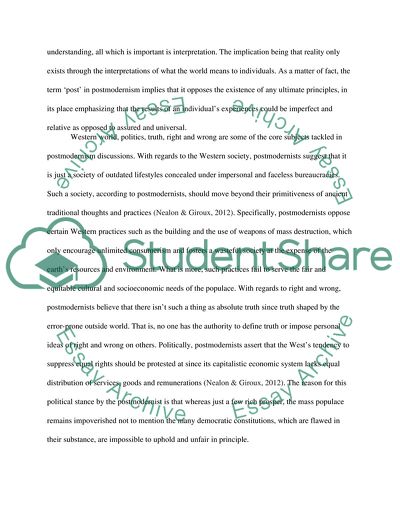Cite this document
(Postmodernism, Power and Discourse Essay Example | Topics and Well Written Essays - 1250 words, n.d.)
Postmodernism, Power and Discourse Essay Example | Topics and Well Written Essays - 1250 words. Retrieved from https://studentshare.org/social-science/1799646-write-a-critical-synopsis-for-3-key-terms-postmodernism-power-and-discourse
Postmodernism, Power and Discourse Essay Example | Topics and Well Written Essays - 1250 words. Retrieved from https://studentshare.org/social-science/1799646-write-a-critical-synopsis-for-3-key-terms-postmodernism-power-and-discourse
(Postmodernism, Power and Discourse Essay Example | Topics and Well Written Essays - 1250 Words)
Postmodernism, Power and Discourse Essay Example | Topics and Well Written Essays - 1250 Words. https://studentshare.org/social-science/1799646-write-a-critical-synopsis-for-3-key-terms-postmodernism-power-and-discourse.
Postmodernism, Power and Discourse Essay Example | Topics and Well Written Essays - 1250 Words. https://studentshare.org/social-science/1799646-write-a-critical-synopsis-for-3-key-terms-postmodernism-power-and-discourse.
“Postmodernism, Power and Discourse Essay Example | Topics and Well Written Essays - 1250 Words”, n.d. https://studentshare.org/social-science/1799646-write-a-critical-synopsis-for-3-key-terms-postmodernism-power-and-discourse.


